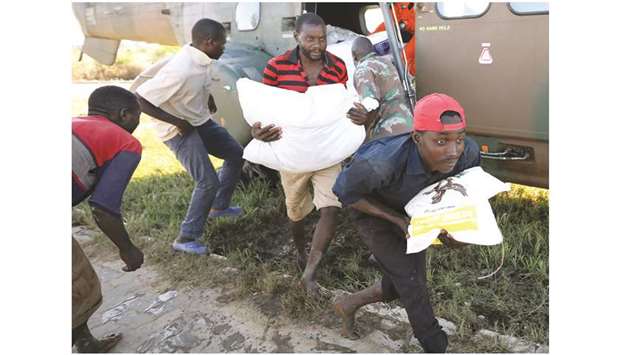Rescuers yesterday said they hoped to reach hundreds of people still stranded more than a week after a powerful cyclone struck Mozambique and swathes of southeast Africa, as roads started to reopen.
Cyclone Idai lashed Mozambique’s port city of Beira with winds of up to 170kph around midnight on March 14, then moved inland to Zimbabwe and Malawi, flattening buildings and killing at least 700 people across the three countries.
“We are more organised now, after the chaos that we’ve had, so we’re delivering food and shelter to more people today,” Mozambique’s Land and Environment Minister Celso Correia told reporters.
Correia said the number of people in makeshift camps had risen by 18,000 to 128,000 since Sunday, most of them in the Beira area.
Communities near Nhamatanda, around 100km northwest of Beira and where some people haven’t received aid for days, would receive assistance today, he added.
The cyclone and the heavy rains that followed hampered aid efforts and blocked deliveries of food and other essentials from Beira, which is an important gateway to landlocked countries in the region.
The water covering vast tracts of land west of the port has been receding, but the size of the disaster zone makes getting aid to the most needy difficult.
Aid workers distributed maize meal in the Chipinge district of eastern Zimbabwe - one of the areas where the cyclone wrought major destruction - while residents struggled without access to power or piped water.
“We lost all our perishables after Cyclone Idai,” Chipinge resident Kudakwashe Mapungwana said.
“Since then we have no electricity at all and women are busy buying charcoal which is very expensive.”
Sebastian Rhodes Stampa, from the United Nations Office for the Co-ordination of Humanitarian Affairs (OCHA), said cases of diarrhoea in Mozambique were increasing and they were keeping a close watch out for any outbreak of cholera.
“It’s a killer,” Rhodes Stampa said of cholera, naming the infection as one of his biggest concerns, alongside more flooding.
The head of the International Federation of Red Cross and Red Crescent Societies (IFRC) Elhadj As Sy said “we are sitting on a ticking bomb” as he called for renewed efforts to address the worsening health situation.
Sy, who had just returned from the region, warned of a “high risk of water-borne diseases” like cholera and typhus - as well as malaria, which is endemic in the region.
A procession of mourners carried the coffin containing the body of Tomas Joaquim Chimukme, who was killed by the cyclone, through saturated marshland outside of Beira yesterday.
Many of those attending wore open sandals in the water which was ankle-high.
The United Nations has warned that stagnant water in many areas, decomposing bodies and the lack of sanitation in overcrowded shelters in Mozambique could create breeding grounds for such diseases.
The government has already identified some suspected but unconfirmed cases of cholera, Sy said.
“That is the reason why I am raising the alarm. Many of these water-borne diseases are a great risk, but they are preventable,” he added.
“The worst thing is the children crying and looking for their parents. It is heartbreaking,” he said, adding that it remained unclear how many children may have been orphaned.
Medical services in the affected region were stretched even before the cyclone hit and according to aid group MSF, Beira hospital’s operating theatre sustained serious damage.
As many as 17 health centres have lost their roofs, it added in a statement.

Workers offload food aid from a South African National Defence Force helicopter in the aftermath of Cyclone Idai in Buzi, near Beira, Mozambique, yesterday.
